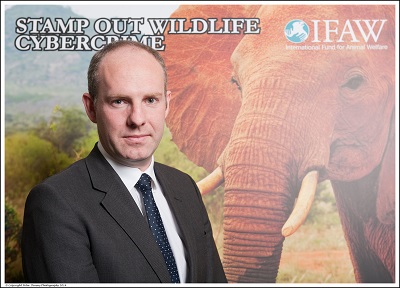
Justin Tomlinson MP has highlighted his concerns about wildlife cybercrime following a shocking report released this week by the International Fund for Animal Welfare (IFAW) which shows how thousands of endangered species are bought and sold on the Internet, many advertised without any form of supporting documentation.
Wanted – Dead or Alive, Exposing Online Wildlife Trade reveals that, in early 2014, an intense six-week investigation found a total of 33,006 endangered wildlife and wildlife parts and products for sale via 280 online market places across 16 countries.
IFAW found the legality of almost 13 per cent – 1,192 - of the 9,482 advertisements investigated was sufficiently doubtful to warrant turning these over to law enforcers for further examination. However this may only be the tip of the iceberg as investigators were careful not to deluge enforcers with reports of potential wildlife crime. The IFAW investigation focuses on the ‘surface-web’, namely open-source websites commonly referred to as online marketplaces, where products are freely available to the public.
In the UK, websites hosted 1,087 online advertisements offering a total of 1,603 items for sale including ivory and suspected ivory, turtles, tortoises, owls, exotic birds, monkeys and parts and products from elephants, rhinos, hippos, crocodiles, alligators and big cats. The items were valued at more than £300,000. Over two-thirds of adverts were for wildlife parts and products rather than live animals.
IFAW’s investigation specifically targeted the sale of species listed on Appendix I and II of the Convention on International Trade in Endangered Species (CITES) which regulates and restricts the trade in wildlife and their parts and products. Many of the 280 online sites monitored either didn’t ask customers to demonstrate that their trade met with national laws, or else the provisos were hidden to the extent that customers simply wouldn’t be aware of them.
Justin Tomlinson MP said: “IFAW’s report is truly shocking and shows the devastating effect of the online trade on wildlife across the world. I have long supported the work of IFAW and helped to organisation parliamentary events with them previously to highlight this abhorrent trade. I continue to offer my support for tougher measures and the strongest possible enforcement of the law to clamp down on this organised criminal activity.”
Philip Mansbridge, UK Director of IFAW, said “Governments need to introduce stronger legislation that specifically targets online wildlife crime and must encourage and support their enforcement agencies in making sure wildlife cybercriminals are apprehended and prosecuted. We would like to thank Justin for his support in saving wildlife and combating international crime.”

